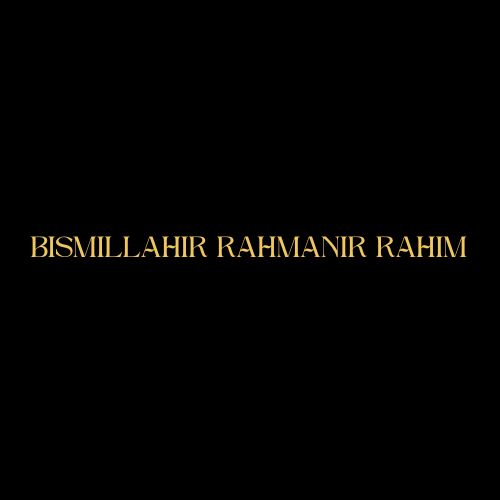Contents
Bismillahir Rahmanir Rahim.
Title: Understanding the Essence of “Bismillahir Rahmanir Rahim”: A Comprehensive Exploration
Bismillahir Rahmanir Rahim
“Bismillahir Rahmanir Rahim,” a conjuring embodying huge significance, fills in as the groundwork of Islamic certainty and practice. This expression, which generally means “for the sake of Allah, the Most Tolerant, the Most Charitable” in English, saturates various parts of a Muslim’s life, including everyday ceremonies and significant profound thought. In this total examination, we plunge into the complicated parts of “Bismillahir Rahmanir Rahim,” unraveling its etymological, strict, and extraordinary profundities.
Linguistic Analysis:
At the phonetic level, “Bismillahir Rahmanir Rahim” involves three unquestionable parts: “Bismillah,” “Rahman,” and “Rahim.” The adage “Bismillah” starts from the Arabic root “b-s-m,” which conveys the prospect of beginning or initiation. “Bismillah” can therefore be used as an invocation to initiate an action and confer divine blessings and direction on it. “Rahman” and “Rahim,” got from a comparable root “r-h-m,” highlight the qualities of Allah as the Most Liberal and the Most Big-hearted, separately. While “Rahman” connotes Allah’s tremendous sympathy and sympathetic actions, including all creation, “Rahim” underlines His specific tolerance and thought towards followers.
Theological Significance:
The philosophical meaning of “Bismillahir Rahmanir Rahim” lies in its certification of Allah’s sway, kindness, and benevolence. By summoning the name of Allah, Muslims recognize His power and look for His endowments prior to setting out on any undertaking. The characteristics of “Rahman” and “Rahim” highlight Allah’s empathetic nature, offering comfort and consolation to adherents in seasons of difficulty and misfortune. Besides, this conjuring fills in as a consistent sign of the essential standards of Islam, underlining the significance of sympathy, leniency, and kindheartedness in human connections.
Spiritual Reflections:
On a profound level, “Bismillahir Rahmanir Rahim” fills in as a passage to more profound examination and association with the heavenly. Presenting this summon prior to taking part in everyday exercises cultivates care and profound mindfulness, mixing ordinary activities with otherworldly importance. Besides, the redundancy of “Bismillahir Rahmanir Rahim” in different settings develops a feeling of lowliness and reliance on Allah’s leniency and direction. It fills in as a wellspring of solidarity and comfort, particularly during seasons of hardship, helping devotees to remember Allah’s unfaltering help and empathy.
Application in Daily Life:
The reasonable use of “Bismillahir Rahmanir Rahim” stretches out past simple recitation to envelop all parts of a Muslim’s life. From performing bathing (wudu) before petitions to leaving on significant choices, summoning the name of Allah imparts a feeling of direction and heavenly direction. In addition, consolidating the standards of “Rahman” and “Rahim” into relational connections cultivates compassion, pardoning, and consideration, mirroring the substance of Islamic lessons.
Conclusion:
Generally, “Bismillahir Rahmanir Rahim” exemplifies the center standards of Islam—accommodation to the desire of Allah, empathy towards all creation, and dependence on divine leniency and direction. Its significant importance resounds across semantic, religious, and otherworldly aspects, filling in as a consistent sign of Allah’s kindheartedness and benevolence. Believers strive to live a life guided by faith, compassion, and divine grace by comprehending and embodying the essence of “Bismillahir Rahmanir Rahim.”
What does bismillahir rahmanir raheem mean?
“Bismillahir Rahmanir Rahim” signifies “for Allah, the Most Liberal, the Most Kind” in English. This sanctified articulation holds huge significance in Islam, finishing in as a sorcerer preceding setting up on any task or endeavor. It hints the affirmation of Allah’s power, liberality, and mercy, searching for His gifts and heading in movements of every kind. The names “Rahman” and “Rahim” emphasize Allah’s inexhaustible kindness and forgiveness toward the entire creation. Recounting “Bismillahir Rahmanir Rahim” injects each part of existence with divine gifts and security, developing a feeling of lowliness and dependence on Allah’s effortlessness. Fundamentally, this conjuring exemplifies the fundamental principles of Islamic faith, reminding followers of the significance of seeking Allah’s guidance and favor in all endeavors.
What is the full line of Bismillah Rahman Rahim?
Title: Understanding the Full Meaning and Significance of “Bismillah Rahman Rahim”
Introduction:
“Bismillah Rahman Rahim,” an expression profoundly implanted in Islamic custom, holds significant importance for Muslims around the world. Meaning “for the sake of Allah, the Most Thoughtful, the Most Benevolent” in English, this conjuring typifies the quintessence of Islamic confidence and practice. We decipher the profound meaning and significance of the entire line of “Bismillah Rahman Rahim” by delving into its linguistic, theological, and spiritual dimensions in this comprehensive investigation.
Linguistic Analysis:
At its etymological center, “Bismillah Rahman Rahim” comprises of three key parts: “Bismillah,” “Rahman,” and “Rahim.” The expression “Bismillah” starts from the Arabic root “b-s-m,” meaning the demonstration of starting or starting an activity for the sake of Allah. “Rahman” and “Rahim,” got from the root “r-h-m,” accentuate two basic ascribes of Allah – His unlimited beauty and benevolence. “Rahman” conveys the possibility of general sympathy, enveloping creation, while “Rahim” underlines Allah’s all’s particular leniency towards adherents.
Theological Significance:
“Bismillah Rahman Rahim”‘s affirmation of Allah’s sovereignty and goodness is what gives it theological weight. By conjuring the name of Allah, Muslims recognize His position and look for His gifts prior to starting any activity or attempt. The traits of “Rahman” and “Rahim” act as steady tokens of Allah’s unlimited empathy and kindness, offering comfort and consolation to adherents at critical crossroads. This summon highlights the basic standards of Islam, stressing the significance of empathy, kindness, and consideration in human communications.
Spiritual Reflections:
On a profound level, “Bismillah Rahman Rahim” fills in as a door to more profound examination and association with the heavenly. Presenting this summon prior to taking part in everyday exercises cultivates care and profound mindfulness, mixing ordinary activities with otherworldly importance. Besides, the redundancy of “Bismillah Rahman Rahim” in different settings develops a feeling of lowliness and reliance on Allah’s kindness and direction. It fills in as a wellspring of solidarity and comfort, particularly during seasons of hardship, helping devotees to remember Allah’s unfaltering help and empathy.
Application in Daily Life:
The reasonable utilization of “Bismillah Rahman Rahim” reaches out past simple recitation to envelop all parts of a Muslim’s life. From performing bathing (wudu) before petitions to leaving on significant choices, summoning the name of Allah imparts a feeling of direction and heavenly direction. In addition, consolidating the standards of “Rahman” and “Rahim” into relational connections cultivates compassion, pardoning, and consideration, mirroring the substance of Islamic lessons.
Conclusion:
All in all, “Bismillah Rahman Rahim” addresses something beyond a simple expression; it embodies the center standards of Islam—accommodation to the desire of Allah, sympathy towards all creation, and dependence on divine leniency and direction. Its significant importance resounds across semantic, religious, and otherworldly aspects, filling in as a consistent sign of Allah’s kindheartedness and benevolence. Believers strive to live a life guided by faith, compassion, and divine grace by comprehending and embodying the full meaning of “Bismillah Rahman Rahim.”


1 thought on “Bismillahir Rahmanir Rahim”